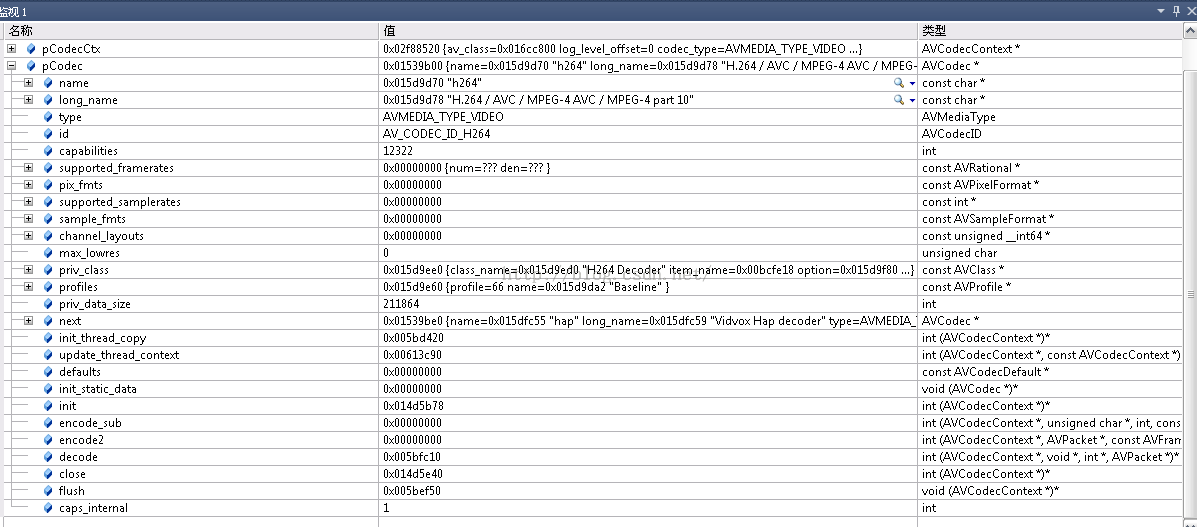ffmpeg重要结构体之AVCodec
ffmpeg重要结构体之AVFrame
ffmpeg重要结构体之AVFormatContext
ffmpeg重要结构体之AVCodecContext
ffmpeg重要结构体之AVCodec
ffmpeg重要结构体之AVIOContext
ffmpeg重要结构体之AVStream
ffmpeg重要结构体之AVPacket
AVCodec结构体是有关codec的结构体。在文件"libavcodec/avcodec.h" 中。
typedef struct AVCodec {
/**
* Name of the codec implementation.
* The name is globally unique among encoders and among decoders (but an
* encoder and a decoder can share the same name).
* This is the primary way to find a codec from the user perspective.
*/
const char *name;
/**
* Descriptive name for the codec, meant to be more human readable than name.
* You should use the NULL_IF_CONFIG_SMALL() macro to define it.
*/
const char *long_name;
enum AVMediaType type;
enum AVCodecID id;
/**
* Codec capabilities.
* see AV_CODEC_CAP_*
*/
int capabilities;
const AVRational *supported_framerates; ///< array of supported framerates, or NULL if any, array is terminated by {0,0}
const enum AVPixelFormat *pix_fmts; ///< array of supported pixel formats, or NULL if unknown, array is terminated by -1
const int *supported_samplerates; ///< array of supported audio samplerates, or NULL if unknown, array is terminated by 0
const enum AVSampleFormat *sample_fmts; ///< array of supported sample formats, or NULL if unknown, array is terminated by -1
const uint64_t *channel_layouts; ///< array of support channel layouts, or NULL if unknown. array is terminated by 0
uint8_t max_lowres; ///< maximum value for lowres supported by the decoder, no direct access, use av_codec_get_max_lowres()
const AVClass *priv_class; ///< AVClass for the private context
const AVProfile *profiles; ///< array of recognized profiles, or NULL if unknown, array is terminated by {FF_PROFILE_UNKNOWN}
/*****************************************************************
* No fields below this line are part of the public API. They
* may not be used outside of libavcodec and can be changed and
* removed at will.
* New public fields should be added right above.
*****************************************************************
*/
int priv_data_size;
struct AVCodec *next;
/**
* @name Frame-level threading support functions
* @{
*/
/**
* If defined, called on thread contexts when they are created.
* If the codec allocates writable tables in init(), re-allocate them here.
* priv_data will be set to a copy of the original.
*/
int (*init_thread_copy)(AVCodecContext *);
/**
* Copy necessary context variables from a previous thread context to the current one.
* If not defined, the next thread will start automatically; otherwise, the codec
* must call ff_thread_finish_setup().
*
* dst and src will (rarely) point to the same context, in which case memcpy should be skipped.
*/
int (*update_thread_context)(AVCodecContext *dst, const AVCodecContext *src);
/** @} */
/**
* Private codec-specific defaults.
*/
const AVCodecDefault *defaults;
/**
* Initialize codec static data, called from avcodec_register().
*/
void (*init_static_data)(struct AVCodec *codec);
int (*init)(AVCodecContext *);
int (*encode_sub)(AVCodecContext *, uint8_t *buf, int buf_size,
const struct AVSubtitle *sub);
/**
* Encode data to an AVPacket.
*
* @param avctx codec context
* @param avpkt output AVPacket (may contain a user-provided buffer)
* @param[in] frame AVFrame containing the raw data to be encoded
* @param[out] got_packet_ptr encoder sets to 0 or 1 to indicate that a
* non-empty packet was returned in avpkt.
* @return 0 on success, negative error code on failure
*/
int (*encode2)(AVCodecContext *avctx, AVPacket *avpkt, const AVFrame *frame,
int *got_packet_ptr);
int (*decode)(AVCodecContext *, void *outdata, int *outdata_size, AVPacket *avpkt);
int (*close)(AVCodecContext *);
/**
* Flush buffers.
* Will be called when seeking
*/
void (*flush)(AVCodecContext *);
/**
* Internal codec capabilities.
* See FF_CODEC_CAP_* in internal.h
*/
int caps_internal;
} AVCodec;
解码某AVC码流文件,过程中有下图:
其中解码相关的变量都很直观:
const char *name:Codec的名字,此例子中为h264。
enum AVMediaType type:媒体类型:视频。
enum AVCodecID id:Codec的ID,比如AV_CODEC_ID_H264。
重要的是其中的几个函数指针:decode()等,将在以后介绍。
